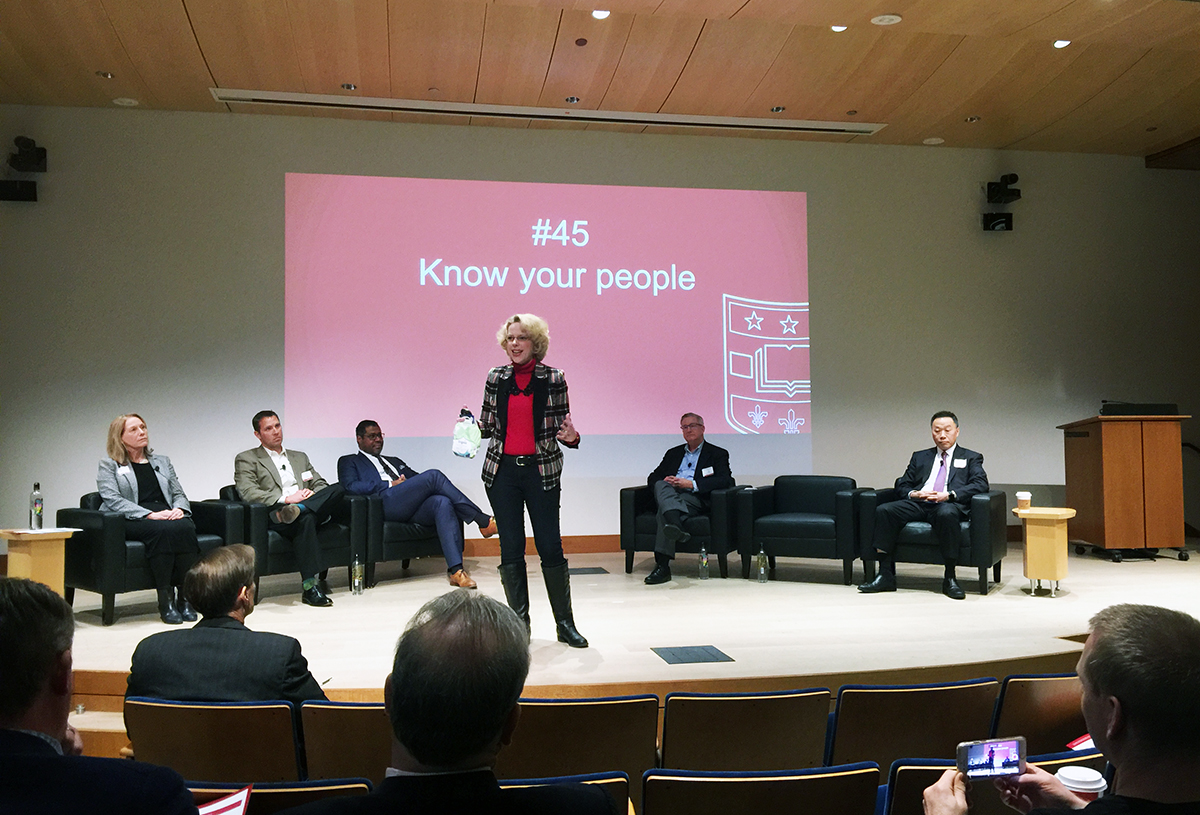Top takeaways on leadership, innovation from “60 ideas in 60 minutes”
- January 11, 2018
- By WashU Olin Business School
- 3 minute read

Tanya Yatzeck, EMBA 43, is a project manager in continuous improvement at Spire Inc. She wrote the following for the Olin Blog.
My first impression walking into the event “60 ideas in 60 minutes,” presented by alumni of Olin’s Executive MBA program on January 9, was that the six panelists mingling among the attendees were EMBA graduates.
That information was on the event invitation, but it didn’t hit home until I overheard them reminiscing about their classes and the fun that they’d had getting together in the years since graduation—just like me and my former classmates. The panelists were us.
Sixty ideas in one hour sounds daunting, but the simplicity of the format made it possible to absorb every single one of them. Each of the six panelists had 10 minutes to present their 10 ideas. Each had a theme, which kept the content fresh from speaker to speaker.
Gene Dobbs Bradford, president and CEO of Jazz St. Louis, used his musical training as a theme, while Jennifer Labit, founder and CEO of Cotton Babies, emphasized her experience in entrepreneurship. Eric Benting, owner and operator of Chik-fil-A, shared his insights about working with very young employees.
Don Halpin spoke of pivoting from a military career to medical innovation, and Ken Yamaguchi about straddling both corporate and university surgical responsibilities. Jan Alonzo, an attorney, provided a practical tool box of tips, including counting good days, blessings, helping others, and the legal and business necessities of becoming informed about the problem of sexual harassment.
While I was there, I was surprised and pleased to run into my classmate from EMBA 43, David Moons, president at his family’s business, Anji Mountain. I asked him why he attends Olin events.
“When you work in a small business, it’s very easy to get focused on just what you’re doing and ignore some of the external factors that are influencing your business,” he said. “WashU events provide me with the opportunity to stay in touch with what other companies are doing and, more importantly, how some global macro factors can be affecting my business and my people.”
I asked David to distill the 60 ideas into his top three:
1. Pull multiple levers. Find your idea and make sure all of your resources support it.
David: “We have a major initiative this year with some patented innovation. I’m cherry-picking different things that we’ll likely do to support that launch, but we’re now thinking more of, “Let’s just pull all the levers.” We don’t really know what’s going to work, and we might as well go full stop as opposed to limit our financial exposure, because we want to make sure this thing is a success.”
2. If you think you know what you’re doing, you’re likely in decline.
David: “That is something that will likely keep me up and still does keep me up on a nightly basis. I think that level of focus—on continuous improvement and not resting on your laurels—is about trying to drive your company and your vision and what you’re doing to improve. It’s something that’s critical. We can’t be successful if we don’t do that.”
3. Use mission to inspire people.
David: “When I think about mission inspiring people, it’s not just my people that I work with at Anji Mountain. It’s more about using our mission as a company to inspire our customers to get further engaged with our business. We compete in a hyper-competitive market. There are a lot of major players that are established. We need to continually find ways to differentiate, and using and leveraging our mission to better position ourselves with our customers is something we’re going to continue to focus on.”
David added, “I’m going to take probably the top 30 and bring it back to my company and my people, and hopefully they can get something out of it and it starts a bigger dialogue.”
I spied another EMBA classmate, Ken Franklin, running out of the event before it was over. I talked to him by phone later in the day.
“I’ve always felt that I have a moral compass guiding tough decisions, but I didn’t realize that it’s a skill,” he said. “At the end of the day, you want to do the right thing, be honest, have integrity, and build character. That’s what leaders do. My big takeaway—big ideas come from the heart.”
Media inquiries
For assistance with media inquiries and to find faculty experts, please contact Washington University Marketing & Communications.
Monday–Friday, 8:30 to 5 p.m.
Sara Savat
Senior News Director, Business and Social Sciences
